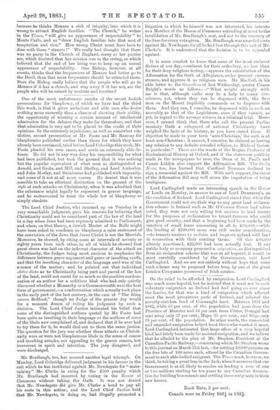On the relief to be afforded by emigration, Lord Carling
ford was much more hopeful, but he insisted that it must not be such voluntary emigration as Ireland had had going on ever since the famine, for that was a kind of emigration which affected most the most prosperous parts of Ireland, and relieved the poverty-stricken land of Connaught least. Between 1851 and 1882, while 63 per cent. of the population had gone from the Province of Munster and 44 per cent. from Ulster, Donegal had sent away only 37 per cent., Mayo 35 per cent., and Sligo only 31 per cent. of the population. In other words, the unassisted and unguided emigration helped least those who wanted it most. Lord Carlingford intimated that large offers of a very hopeful kind had lately been made for assisted emigration, and we believe that he alluded to the plan of Mr. Stephen, President of the Canadian Pacific Rail way,—concerning which Mr. Stephen wrote to this journal on March 31st last,—for settling 50,000 persons on the free lots of 160 acres each, offered by the Canadian Govern- ment to each able-bodied emigrant. The Times must, however, we think, be taking a great leap in the dark, when it assumes that our Government is at all likely to resolve on lending a sum of one or two millions sterling for ten years to any Canadian Associa- tion for building homesteads and settling these emigrants in their new homes.


































 Previous page
Previous page